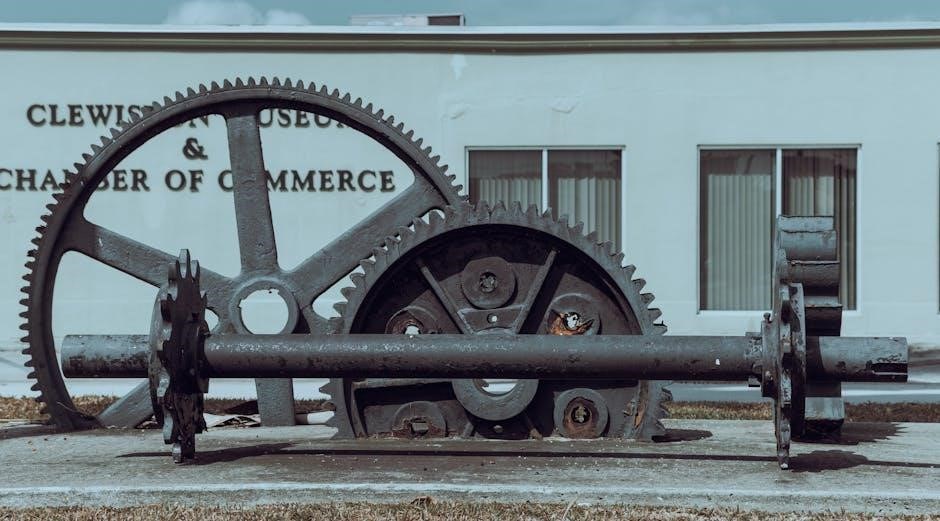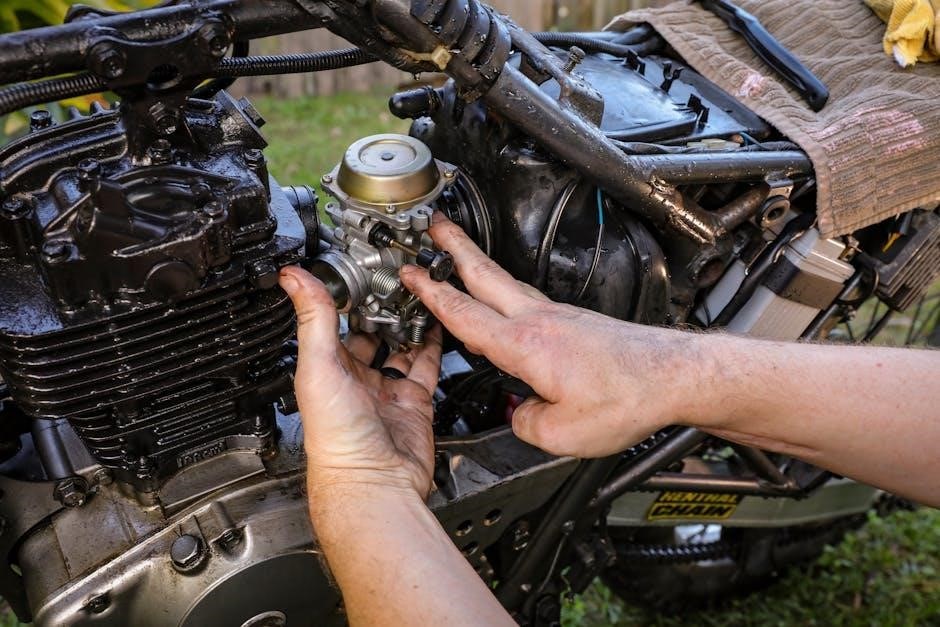Overview of Mechanics Liens in Florida
A mechanics lien is a legal tool in Florida that allows contractors and suppliers to secure payment for labor and materials․ It creates a lien on the property, ensuring payment for work performed or materials provided․ Understanding this process is crucial for protecting both contractors’ rights and property owners’ interests․ Proper documentation and adherence to state laws are essential to ensure valid lien claims and avoid disputes․ This overview provides a foundational understanding of mechanics liens in Florida, their purpose, and their significance in construction projects․
1․1․ Definition and Purpose of a Mechanics Lien in Florida
A mechanics lien in Florida is a legal claim filed against a property by contractors, subcontractors, or suppliers who have not been paid for their labor, materials, or services․ It serves as a security interest on the property, ensuring payment for work performed or materials provided․ The purpose of a mechanics lien is to protect parties involved in construction or improvement projects from non-payment, providing a legal recourse to recover unpaid amounts․ By filing a lien, claimants can enforce their right to payment, potentially leading to the sale of the property to satisfy the debt․ This mechanism is essential for maintaining fairness and accountability in the construction industry, ensuring that contributors to a project are compensated for their contributions․
1․2․ Importance of Understanding Mechanics Liens for Contractors and Property Owners

Understanding mechanics liens is crucial for both contractors and property owners in Florida to navigate the complexities of construction projects effectively․ For contractors, this knowledge ensures they can secure payment for their work and materials, protecting their rights if disputes arise․ Property owners, on the other hand, benefit by understanding how liens can impact their property, allowing them to take proactive steps to avoid unexpected claims․ A clear understanding of mechanics liens helps all parties avoid legal disputes, ensure timely payments, and maintain smooth project operations․ It also highlights the importance of proper documentation and adherence to Florida’s legal requirements, which are essential for resolving payment issues efficiently and fairly․

Filing a Mechanics Lien in Florida
Filing a mechanics lien in Florida involves preparing and notarizing the claim, recording it with the county clerk, and serving notice to the property owner, ensuring compliance with state laws․
2․1․ Step-by-Step Process for Filing a Mechanics Lien
Filing a mechanics lien in Florida requires a structured approach․ First, prepare the lien document, including project details, parties involved, and the amount owed; Next, notarize the document․ Then, record it with the county clerk’s office where the property is located․ After recording, serve a copy to the property owner via certified mail․ Ensure compliance with Florida’s lien laws, including the 90-day filing deadline from the last work performed; Proper documentation and adherence to these steps are crucial for enforcing payment rights․ Failure to follow the process accurately may invalidate the lien, highlighting the importance of precise execution․

2․2․ Required Documentation and Forms for Filing
To file a mechanics lien in Florida, specific documentation is mandatory․ The primary form required is the Claim of Lien, which must include details such as the property description, the amount owed, and the nature of the work performed․ Additionally, a Notice of Commencement may be necessary if it was recorded at the start of the project․ Proper notarization of the lien document is essential before submission․ Supporting documents like contracts, invoices, and records of communication may also be needed to validate the claim․ Ensure all forms are completed accurately and in compliance with Florida statutes․ Submitting incomplete or incorrect documentation can delay or invalidate the lien process․ Always verify the most current forms and requirements with the county clerk’s office to avoid discrepancies․
Mechanics Lien Waivers in Florida
Mechanics lien waivers are legal documents used to relinquish the right to file a lien․ They are crucial for finalizing projects and ensuring payment to contractors and suppliers․
3․1․ Types of Mechanics Lien Waivers and Their Uses

Mechanics lien waivers in Florida come in various forms, each serving distinct purposes․ The most common types include partial waivers, which release a lien for a specific payment or phase, and final waivers, used upon full payment․ Unconditional waivers release all lien rights immediately, while conditional waivers depend on payment clearance․ These documents are essential for project completion, as they provide assurance to property owners and contractors that payment obligations are met․ Proper use of waivers ensures smooth transactions and prevents disputes․ Understanding the differences and appropriate uses of each type is crucial for maintaining compliance and safeguarding interests in construction projects․
3․2․ Common Mistakes to Avoid When Using Waivers
When utilizing mechanics lien waivers in Florida, several common mistakes can lead to legal complications․ One major error is failing to customize waivers for specific projects, which can render them ineffective․ Another mistake is signing waivers before receiving payment, as this may forfeit the right to file a lien․ Additionally, using outdated or incorrect forms can invalidate the waiver․ Many individuals also neglect to properly document the waiver process, leading to disputes․ Furthermore, failing to consult with an attorney to ensure compliance with state laws can result in unintended consequences․ Finally, not understanding the conditional or unconditional nature of waivers can lead to financial risks․ Avoiding these mistakes ensures that waivers are used effectively and protect all parties involved in construction projects․
Recent Changes in Florida Mechanics Lien Laws
Florida has introduced updates to mechanics lien laws, focusing on streamlined processes and enhanced clarity․ These changes aim to reduce disputes and improve compliance for all parties involved․
4․1․ Legislative Updates and Their Impact on Lien Filings
Recent legislative updates in Florida have streamlined the mechanics lien filing process, enhancing clarity and reducing disputes․ These changes include stricter deadlines for filing notices and liens, ensuring timely resolutions․ Additionally, new requirements for documentation accuracy have been implemented to prevent errors․ The updates also clarify lien waiver procedures, making it easier for contractors to manage payments securely․ Property owners benefit from improved transparency, reducing the risk of unexpected liens․ Overall, these legislative adjustments aim to balance the interests of all parties involved, promoting fairness and efficiency in construction projects․ Compliance with these updated regulations is essential for avoiding legal complications and ensuring smooth project execution․
4․2․ How Recent Court Rulings Affect Mechanics Lien Practices
Recent court rulings in Florida have significantly influenced mechanics lien practices, particularly in cases involving lien validity and enforcement․ Courts have emphasized the importance of strict compliance with statutory requirements, such as timely filing and proper documentation․ For instance, rulings have clarified that failure to adhere to deadlines or provide accurate notices can result in lien dismissal․ Additionally, courts have addressed disputes over lien priority and payment distribution, providing clearer guidelines for resolving such issues․ These decisions underscore the need for contractors and property owners to seek legal counsel to navigate complexities․ The rulings also highlight the importance of maintaining detailed records and understanding lien waiver agreements to avoid legal challenges․ These changes aim to ensure fairness and transparency in construction payment disputes, while protecting the rights of all parties involved in the process․

Best Practices for Managing Mechanics Liens in Florida
Proper documentation and precise record-keeping are essential for managing mechanics liens in Florida․ Ensure compliance with state laws and maintain clear communication throughout the project to avoid disputes and ensure timely payments․
5․1․ Working with Attorneys to Ensure Compliance
Engaging experienced construction attorneys is crucial for navigating Florida’s mechanics lien laws․ Legal professionals ensure all documentation, such as lien notices and waivers, comply with state requirements․ They can review contracts, verify timelines for filing liens, and provide guidance on dispute resolution․ Attorneys also help contractors and property owners understand their rights and obligations, reducing the risk of legal errors․ Regular consultations with lawyers can prevent misunderstandings and ensure that all parties adhere to Florida’s specific regulations․ By involving legal experts early in the process, stakeholders can avoid costly delays and ensure smooth project execution․ Proper legal oversight is essential for maintaining compliance and achieving favorable outcomes in mechanics lien matters․
5․2․ Importance of Proper Documentation and Record-Keeping
Maintaining accurate and detailed records is essential for effectively managing mechanics liens in Florida․ Proper documentation ensures that all parties involved can verify the work performed, materials supplied, and payments made․ Clear records help prevent disputes and provide a strong foundation for enforcing lien rights․ Contractors should keep detailed invoices, contracts, and communication logs․ Property owners also benefit from organized documentation to track project progress and payments․ In the event of a lien dispute, well-maintained records are critical for supporting claims in court; Additionally, accurate record-keeping streamlines the lien filing process and ensures compliance with Florida’s legal requirements․ Neglecting this step can lead to delays, payment issues, or even the dismissal of a lien claim․ Therefore, prioritizing thorough documentation is vital for all stakeholders involved in construction projects․
